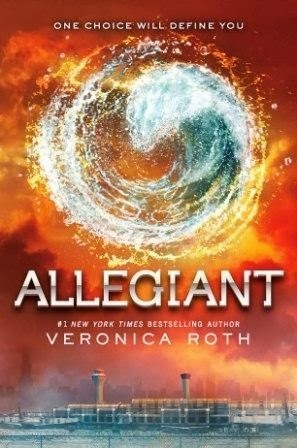Allegiant by Veronica Roth: A Spoiler-Filled Review & Discussion
 I know you've all been dying to hear my thoughts about Allegiant (approximately a month after everyone else has already moved on). I aim to please.
I know you've all been dying to hear my thoughts about Allegiant (approximately a month after everyone else has already moved on). I aim to please.I normally don't reveal anything too spoilery in my reviews, but this is the kind of book where I'd like to discuss the Big Things that happen, and spoilers are necessary. I'm also going to assume that a great many of you have read this one already.
Overall, I liked it. I didn't love it, which is in keeping with my feelings about the series as a whole. Generally, the third and concluding volume of a dystopian trilogy is the one chock full of the most secrets, usually huge ones about the very nature of the society's existence. Allegiant falls very neatly in line with this trend - the revelation about the Genetically Pure (divergent) versus Genetically Damaged (non-divergent) was the sort of thing I expected. It wasn't earth-shattering or hugely imaginative, but it made sense within the context of the story and I was satisfied by it.
That said, I was frustrated by a few plot contrivances. Partway through the story, we're told by one of the scientists helping to run the experiments that he thinks Tobias may not be truly divergent. The scientist runs genetic tests on both Tris and Tobias, and it turns out that Tobias is, indeed, "genetically damaged," and non-divergent. I would have accepted this more readily if there were an explanation given for the scientist's initial suspicion. What was it in Tobias' behavior that made the scientist believe he may not be divergent/GP? We never find out. Instead, it seems this is a shortcut to give Tobias motivation for his next set of disastrous actions and the necessary rift between him and Tris. I was disappointed by this - it seemed like forced plot manipulation, rather than something that grows organically from the story and its characters.
The introduction of Tobias' perspective has mixed results. I loved getting into his head and discovering that he is flawed, that he fears. The subplot involving his relationship with his mother has been derided by some reviewers, but I thought it was pretty great and very teen (albeit magnified). Seeing him without Tris' filter is quite illuminating and humanizes him greatly. His voice, however, is so similar to Tris' that I found myself flipping back a few pages every now and then to remind myself who was narrating.
The biggest thing, and the thing I'm most torn about, is Tris' death. Roth set up the situation perfectly so that it had to be Tris to face the death serum. She's the one with the resistance, we've known this since the first book. She's also the one who tends to sacrifice the most, even for those who have betrayed her. It had to be her to go into the room. And it would have been impossible to believe that she could have escaped alive, knowing that their plan was pretty sloppy. Of course someone was waiting for her. It seemed like Roth had made this very big decision - to kill off her protagonist - early on in the series. Because of that, it didn't feel manipulative. It's incredibly gutsy, and I love that she went there. The way it's written is heart-wrenching and highlights the importance of familial love, which always gets me.
My problem is with the existence of the serums in the first place. Yes, they're there from the beginning, so they don't quite feel like basic plot devices...but they actually kind of do. They seem so simplistic. Death serum causes you to die. Truth serum causes you to tell the truth. There doesn't seem to be much science (or even "science") behind their makeup, and the reason they exist in the first place is pretty weak. And I'm still waiting for an explanation as to why Tris was extraordinarily resistant.
My review up until this point makes it sound like I was pretty tepid toward the book, which is not the case. I liked it quite a lot. It's a hefty book, but the pages flew by for me; I was thoroughly engrossed. Yes, I've read better books, and yes, I found flaws, but this concluding volume was so readable and so well-paced and so exciting. It's certainly better than the second book. It has great ideas. It holds true to its characters. It expands the dystopian world. It introduces some hefty themes about human nature and violence. It's a solid closer and I'm a bit sad it's all over.
I'd love for others to chime in with their thoughts, particularly if you agree/disagree with any of the points I addressed here.








Published on January 07, 2014 22:00
No comments have been added yet.



